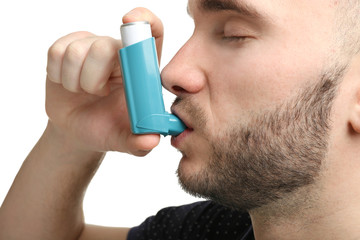
Asthma is a chronic disease characterized by airway inflammation, obstruction, and hyper-reactivity that affects 8% of the U.S. population. Symptom severity is often exacerbated by psychological stress, and stress-reduction techniques may have an important role in asthma control.
Higgins et al. [Brain, Behavior, & Immunity] conducted a randomized, controlled study to test whether Mindfulness-Based Stress Reduction (MBSR) improves asthma control and reduces airway inflammation.
The researchers randomly assigned 73 adults with clinically diagnosed asthma (average age = 38 years; 59% female) to either MBSR or a wait-list control. MBSR was the standard 8-week group intervention including the intensive one-day meditation retreat.
Study assessments were conducted at baseline, the midpoint of the intervention, post-intervention, and at four monthly follow-ups. Participants were assessed on self-reported asthma severity, the amount of nitric oxide in their breath, sputum and blood eosinophil counts, and self-report measures of stress and mindfulness (the Five Facet Mindfulness Questionnaire).
Nitric oxide is a biomarker for airway inflammation. Eosinophils are white cells in the blood that are elevated in inflammatory diseases. Nitric oxide and eosinophil levels are up-regulated by separate interleukin pathways (IL-13 and IL-5 respectively). Nitric oxide is a specific biomarker for Type 2 asthma, the most common asthma subtype.
At baseline, asthma severity was significantly associated with higher levels of stress and general psychological symptomatology. Over the course of treatment, the MBSR group showed increased levels of mindfulness and decreased levels of psychological symptomatology compared to the control group.
Self-reported asthma severity showed significantly greater improvement in the MBSR group as compared to the control group (d = 0.76), and this benefit was maintained throughout the 4-month follow-up period.
Thirty-two percent of participants in the MBSR group showed clinically meaningful asthma improvement compared to only 13% of the control group. There was a modest but significant decrease in nitric oxide levels for MBSR group compared to the control group. Sputum and blood eosinophils showed no significant differences by study group.
The study shows MBSR improves self-reported asthma control and decreases nitric oxide levels in people with asthma. The study was limited by its use of a waiting list control and by measuring only two inflammatory biomarkers.
Reference:
Higgins, E. T., Davidson, R. J., Busse, W. W., Klaus, D. R., Bednarek, G. T., Goldman, R. I., Sachs, J., & Rosenkranz, M. A. (2022). Clinically relevant effects of Mindfulness-Based Stress Reduction in individuals with asthma. Brain, Behavior, & Immunity - Health.
Link to study